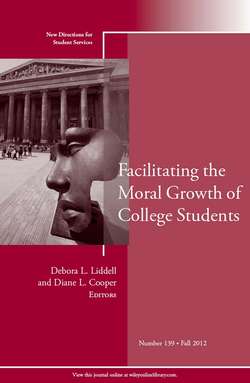Описание книги
Moral development is a powerful task of young adulthood, and attending to that development is a mandate expected of institutions of higher education. Liddell and Cooper offer a practical approach to understanding how moral learning occurs as well as the role of mentors and educators in facilitating that learning. Using Rest's Four Component Model–moral sensitivity, judgement, motivation, and action–they describe powerful campus initiatives for moral growth, including service learning, civic engagement, campus judicial systems, diversity and social justice initiatives, and sustainability efforts. Guidelines for effective moral mentorship are examined, and assessment approaches are described in detail. This is the 139thvolume of this Jossey-Bass higher education quarterly series. An indispensable resource for vice presidents of student affairs, deans of students, student counselors, and other student services professionals, New Directions for Student Services offers guidelines and programs for aiding students in their total development: emotional, social, physical, and intellectual.
